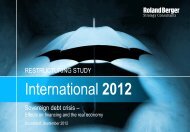issue 1 - Roland Berger
issue 1 - Roland Berger
issue 1 - Roland Berger
You also want an ePaper? Increase the reach of your titles
YUMPU automatically turns print PDFs into web optimized ePapers that Google loves.
the dragon prepares to leap<br />
food for thought f<br />
China goes Europe<br />
Chinese companies have been gearing up for their long march to<br />
the West for quite some time. Their joint ventures with established<br />
brand-name manufacturers and acquisitions of smaller companies<br />
make up for their weaknesses in service and marketing.<br />
:<br />
China is coming. Just ask any of the<br />
happy few with membership at Berlin’s<br />
China Club how close it has really got. The<br />
club has a bar, library and seven private<br />
dining rooms done up in a 1930s Shanghai<br />
Art Deco style with salmon-pink satin walls,<br />
luxuriously intricate 19th century Chinese<br />
art and oil paintings of post-Mao Red<br />
Guards. In the restaurant, head chef Tam<br />
Kok Kong prepares his signature dish—<br />
wasabi prawns.<br />
When she founded this exclusive club in the<br />
Adlon Hotel at Berlin’s Brandenburg Gate,<br />
Anne Maria Jagdfeld drew inspiration from<br />
the China Club in Hong Kong, of which she<br />
has been a member for many years. “I wanted<br />
to create a glamorous, cosmopolitan social<br />
club where members can network at the<br />
highest level,” says Jagdfeld, who also owns<br />
Quartier 206, a posh Berlin department<br />
THE FLOW OF FUNDS IS STILL<br />
HIGHLY IRREGULAR, BUT CHINA’S<br />
INVESTMENTS ARE RAPIDLY GROWING<br />
store. Much of that networking is conducted<br />
with businesspeople from China itself.<br />
The Chinese are coming as students,<br />
tourists, immigrants and investors. According<br />
to Professor Rolf D. Cremer, vice president<br />
of the International Business School<br />
in Shanghai, who has twenty years of professional<br />
experience in Asia, Chinese companies’<br />
global expansion is not just about<br />
their looking for new sales markets. It also<br />
has to do with China’s image of itself as a<br />
world leader. China does not see itself in the<br />
long term as the world’s mass production<br />
center, as merely contributing cheap labor<br />
to the manufacturing sector. Bessie Lee,<br />
CEO of the market research company<br />
Mindshare & Maxus China, confirms this:<br />
“By globalizing, Chinese companies improve<br />
their image.” (See sidebar.)<br />
In 2003, according to the OECD, only<br />
around $600 million in Chinese capital went<br />
abroad, while China itself drew direct investment<br />
to the tune of $53 billion. However,<br />
it can be assumed that in the future,<br />
“Chinese investments abroad will quickly<br />
increase past current levels.” That is the<br />
conclusion of a recent report prepared by<br />
the German embassy in Beijing.<br />
Where is the money going? “North America<br />
remains the developed market of choice,<br />
followed by Western Europe,” says Wei<br />
Zhou, a <strong>Roland</strong> <strong>Berger</strong> consultant in<br />
Shanghai and author of a study entitled<br />
“From Middle Kingdom to global market.”<br />
This study describes the expansion strategies<br />
of China’s top 50 corporate groups.<br />
Fifty-six percent of these companies are<br />
seeking new sales markets overseas because<br />
their internal dynamics are driving them to<br />
expand internationally. Companies that<br />
manufacture PCs, TVs or air conditioners<br />
are finding it necessary to increase their<br />
exports since domestic production capacities<br />
are exceeding local demand.<br />
Market entry seldom takes the form of a<br />
head-on assault. China’s groups “are on the<br />
lookout for segments that market leaders<br />
have already given up or that they are no<br />
„<br />
Why are Chinese companies expanding?<br />
That has a great deal to do with<br />
China’s perception of itself as a great<br />
nation. China compares its economic<br />
importance to that of countries like the US, Japan,<br />
Germany and Great Britain. By globalizing, Chinese<br />
companies are enhancing their prestige. The government<br />
is backing these companies and encouraging<br />
them to become active worldwide. China has a very<br />
different attitude toward competition than other<br />
Asian countries.<br />
Bessie Lee, CEO, Mindshare & Maxus China<br />
»<br />
Self-image counts<br />
Right now, it seems like the high-tech industries are<br />
most aggressive in expanding abroad. Examples<br />
include IT companies such as Lenovo and homeelectronics<br />
manufacturers such as Haier and TCL.<br />
These groups have highly developed products and<br />
abilities. I suspect that such high-end markets guarantee<br />
them a better return from a financial perspective<br />
as well as in terms of image and national prestige.<br />
Chinese companies are most interested in<br />
Europe and the United States simply because of the<br />
size of these markets.<br />
Looking into the future, consider this: Less than 20<br />
years after its markets opened up, already 6 percent<br />
of all Asia’s top 50 companies are<br />
Chinese, which is absolutely impressive.<br />
I expect this figure will double by<br />
2020, and possibly even triple.<br />
»<br />
think: act 9
















